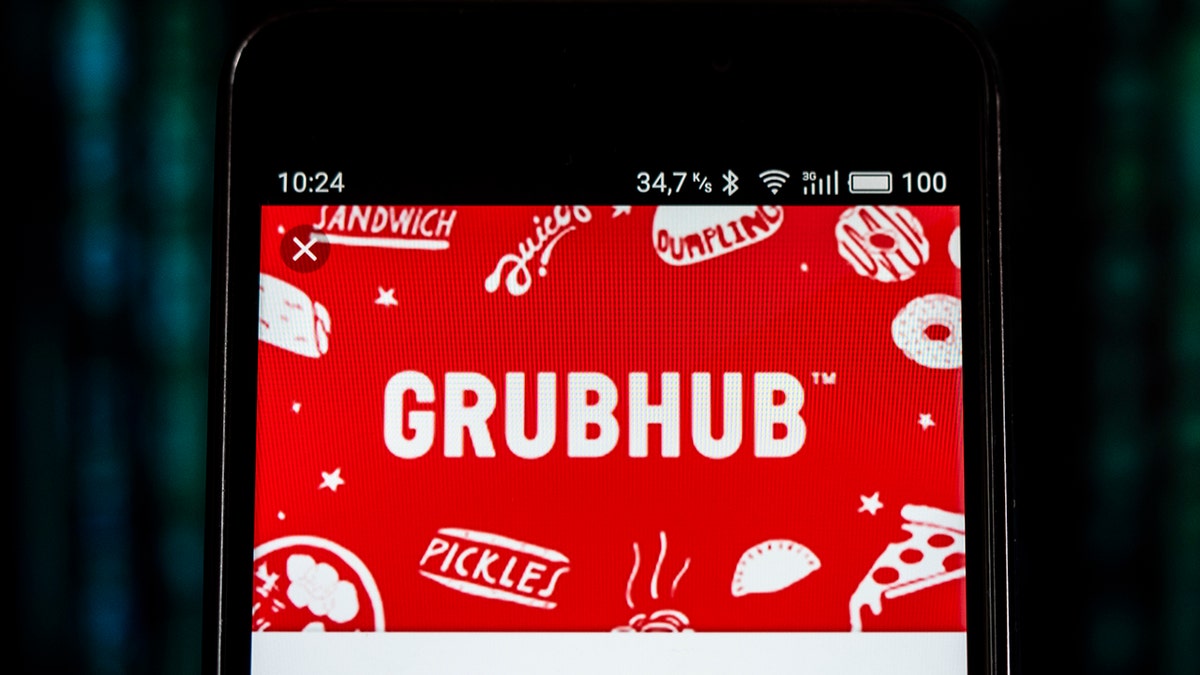Fox News Flash top headlines for May 21
Fox News Flash top headlines are here. Check out what's clicking on Foxnews.com.
Restaurants across the country are pushing back against third-party delivery apps as more Americans turn to their services during the COVID-19 crisis when establishments have been forced to close dining rooms and focus only on takeaway options.
Owners are struggling to keep restaurants open amid the pandemic, which has forced them to change hours, lay off employees and, in some cases, increase prices just to stay afloat. Now some of these stressed restaurants say third-party delivery apps such as Grubhub, DoorDash and Uber Eats are causing even more economic issues. But those providers say they are on the restaurants' side, and couldn't exist without them.

According to reports, business owners are left with fractions of their earnings after these third-party apps collect their exorbitant fees. (Igor Golovniov/SOPA Images/LightRocket via Getty Images)
APPLEBEE'S, CHUCK E. CHEESE OPERATE UNDER DIFFERENT NAMES ON DELIVERY APPS
According to these business owners, restaurants are left with a fraction of their earnings after third-party apps collect their "exorbitant" fees. Some, such as DoorDash, have also been accused of misleading consumers without consent from the restaurant owners, hijacking their Google listings and placing itself as the restaurant’s preferred delivery option.
Restaurant owner John Stamos of Pitas and Sticks in Brooklyn, N.Y., began placing a note inside each delivery bag to its customers, describing Grubhub's commission fees.
CLICK HERE TO SIGN UP FOR OUR LIFESTYLE NEWSLETTER
"Small businesses like us need your support in this time of crisis," Stamos writes in each note. "Online apps such as GRUBHUB ARE CHARGING US 30% of each order and $9 or more on orders made using phone numbers on their app or website … please help save the restaurant industry by ordering directly with us,” the note read, NBC News reported.
Restaurants are pleading with their customers to order directly from their business pages instead of turning to the convenience of delivery apps. Some have even begun offering special deals available to those that order from them directly.
Chain restaurant Bareburger started advertising its specials “only available on bareburger.com.” It also placed signage urging people to “support your local restaurants & order directly with them,” according to the outlet.
FOLLOW US ON FACEBOOK FOR MORE FOX LIFESTYLE NEWS
Mesa Pizza Co. also took out ads slamming Grubhub and asking customers to call them directly.
“When the delivery platform takes 30 percent, it means almost all restaurants that are using the delivery platforms are running at break-even or actually at a loss for every time you place an order.”
“How it works is the delivery platforms come into a market, and they usually start by putting all of the restaurants’ menus on their platforms,” Travis Stoliker, co-owner of Saddleback BBQ in Lansing, Mich., told the Lansing State Journal. "They basically scrape the Internet, find our menus and they list us and they create essentially websites that are about our restaurant. And they haven’t gotten permission to do that."
“When the delivery platform takes 30 percent, it means almost all restaurants that are using the delivery platforms are running at break-even or actually at a loss for every time you place an order," Stoliker added.
Grubhub denies the allegations, instead blaming high rent and taxes -- not Grubhub's commission fees, which it says are used for delivery costs and marketing.
"Grubhub is neither a public utility nor simply a delivery service. In the simplest of terms, Grubhub is a marketing engine and an order generation business -- connecting hungry diners to great, local restaurants," a spokesperson for Grubhub said in a statement to Fox News.
"The platform is free for any restaurant owner who chooses to join, and Grubhub offers a fee-for-service model, meaning that restaurant owners select the services they want and only pay when Grubhub generates a sale. Restaurants have many options to drive business besides third-party marketplaces, none of which are seeing their fees regulated."
CLICK HERE TO GET THE FOX NEWS APP
Cities have moved to cap fees that delivery companies can charge. DoorDash even cut its commission fees in half, and Uber Eats says it stopped charging delivery fees for more than 100,000 independent restaurants in an effort to help.
The caps, which have been implemented in several cities across the U.S., have been vehemently opposed by Grubhub, claiming they would hinder restaurants' earnings.
"On the face of it, a cap on fees seems to be an easy solution to help restaurants that are struggling due to the coronavirus. And there is nothing we want more than to ensure the health of independent restaurants -- we don’t have a business without them," the statement read.
"But this solution is exactly the wrong thing to do. In reality, this proposed cap will lower order volume to locally-owned restaurants, increase costs -- and headaches -- for small business owners, and raise costs to customers. Delivery workers, who are currently relying on Grubhub to earn an income including 100 percent of tips from diners, would have fewer work opportunities and lower earnings. In the middle of what is quickly becoming one of the worst economic downturns in a century, Grubhub is ensuring that workers in New York City can continue to provide for themselves and their families."
A spokesperson for DoorDash did not respond to requests for comment.

